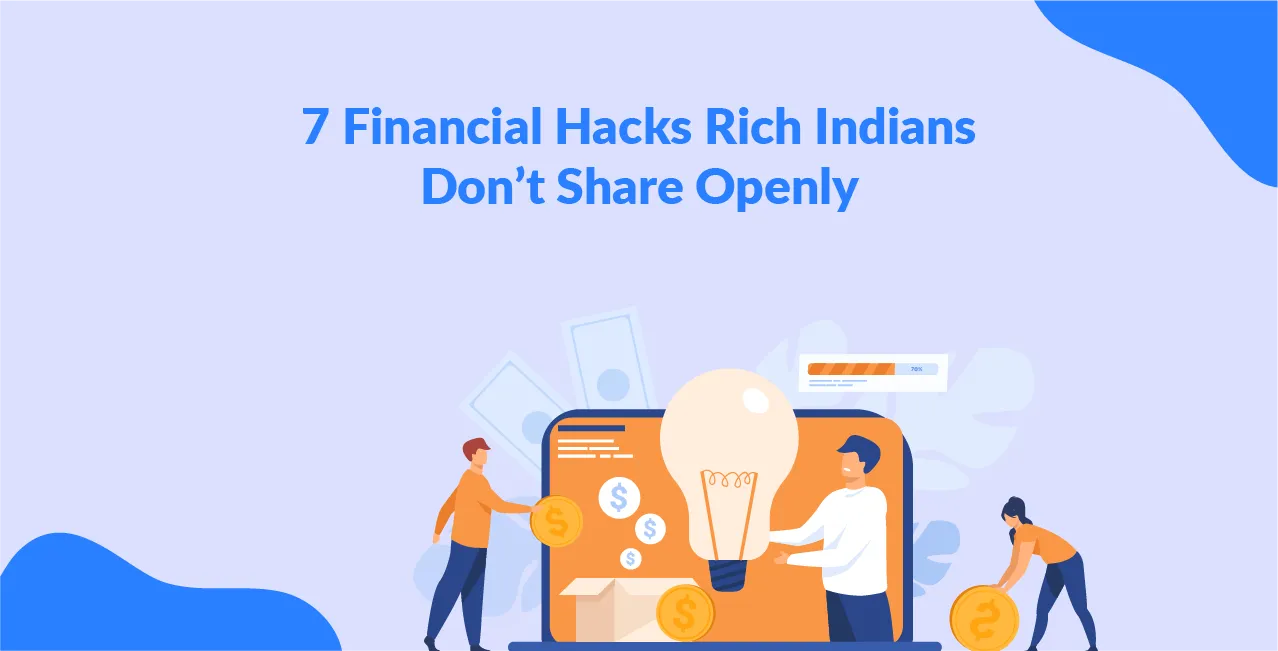7 Financial Hacks Rich Indians Don’t Share Openly

Check Your Loan Eligibility Now
By continuing, you agree to LoansJagat's Credit Report Terms of Use, Terms and Conditions, Privacy Policy, and authorize contact via Call, SMS, Email, or WhatsApp
Rich Indians guard these money-making tricks like family jewels. While ordinary folks struggle with taxes and investments, the wealthy quietly build fortunes using clever strategies most people never discover. Let's explore these hidden gems together in this blog.
1. Tax-free Farm or Agricultural Land Income
In India, income from agricultural land is tax-free under Section 10(1) of the Income Tax Act. This includes earnings from farming, rent from agricultural land, and income from farmhouses used for agricultural purposes.
However, if agricultural income exceeds ₹5,000 and non-agricultural income surpasses the basic exemption limit (₹2,50,000 for individuals below 60), it influences the tax rate on non-agricultural income through partial integration.
Example: Harsh's Income Breakdown
Since Harsh's agricultural income is over ₹5,000 and his salary exceeds ₹2,50,000, his tax on salary is computed using the partial integration method.
2. Keeping Capital Income Underreported
Wealthy Indians often underreport capital income to reduce taxes. This is done by not declaring profits from assets like stocks or property. Such income is called 'unrealised capital gains' and is not taxable until the asset is sold.
By holding onto these assets, the rich avoid paying taxes on their increased value. This practice leads to a significant amount of income going unreported.
Example: Shivam's Capital Income
Shivam has ₹14,00,000 in unrealised gains but reports no income from these assets. This means he pays no tax on this increase in wealth.
3. Offshore Tax Havens (e.g., Vanuatu, Malta)
Offshore tax havens are countries with low or no taxes. They offer privacy and simple rules. Rich Indians use them to reduce taxes. Vanuatu and Malta are popular choices. Vanuatu has no income or capital gains tax. Malta offers refunds that lower the tax to about 5% for foreign investors.
These havens help protect wealth and avoid scrutiny. But they can lead to legal issues if misused. Many Indians have been found with money in such places.
An example of how it works:
4. Tax-advantaged Investments (ELSS, PPF, etc.)
Tax-advantaged investments like ELSS and PPF help save tax under Section 80C. ELSS, or Equity Linked Savings Scheme, is a mutual fund investing in stocks. It has a 3-year lock-in and potential for higher returns. PPF, or Public Provident Fund, is a government-backed savings scheme with a 15-year lock-in and fixed interest.
Read More – Secret Real Estate Investment Hacks
Both allow up to ₹1,50,000 annual investment for tax deduction. ELSS suits those seeking higher returns and can handle market risks. PPF is ideal for risk-averse investors wanting stable, tax-free returns.
Karan invests ₹10,000 monthly in ELSS via SIPs. He also contributes ₹20,000 annually to PPF. His total annual investment is ₹1,40,000, all eligible under Section 80C.
By combining ELSS and PPF, Karan balances risk and stability while maximising tax benefits.
5. Insurance Portability Hack
Health insurance portability lets you switch insurers without losing benefits like waiting periods and no-claim bonuses. This is useful if you are unhappy with your insurer or want better coverage. You must apply at least 45 days before renewal.
Example: Nitin's Portability Journey
Nitin, aged 28, had a health plan with Insurer A:
Nitin ported to Insurer B. He retained his ₹60,000 bonus and completed the waiting period. Now, he pays ₹2,000 less annually, has more hospital options, and better claim service.
6. Smart Credit-Card Management
Smart credit‑card management helps rich Indians keep control and grow their credit. Use only one or two cards you trust. Pay your full balance every month. Avoid interest charges. Set up auto‑payments for the statement amount. That ensures on‑time payments.
Track your spending. Use card apps to check daily alerts. Redeem rewards wisely. Use cashback or air miles on planned purchases. Do not overspend just for points.
For example, Ritvik uses a credit card with 2 % cashback. He spends ₹50,000 on bills and groceries. He earns ₹1,000 cashback monthly. He clears the full ₹50,000 before the due date. He avoids ₹4,000 in interest (8 % annual). Over a year, he nets ₹12,000 in rewards. That is smart credit‑card use.
7. Long-term Passive Investing (index funds, real estate)
Long‑term passive investing means putting money into index funds or real estate. It is simple. It grows wealth slowly. It needs discipline. It avoids frequent trading. It keeps costs low. It has worked over the years. It builds asset value steadily. It helps beat inflation and is low-stress.
For example, Yash invests ₹10,000 every month in a broad index fund. He has been doing this for 20 years. He earns an average return of 8% per year. After 20 years, his total investment of ₹ 24,000 grows to about ₹ 72,700. He also owns a small rental flat. It gives him ₹15,000 per month. This adds passive income. He does not trade often. He lets time work for him. It delivers financial peace of mind.
Conclusion
Rich Indians use smart tricks like tax-free farm income, offshore accounts, and passive investing to save money. Always follow the rules and consult experts to stay safe.
FAQs
1. Is farming income tax-free in India?
Yes, income from agriculture is tax-free under Indian law.
2. Can I avoid tax by keeping money abroad?
Some people use offshore accounts, but it’s risky and may be illegal.
3. What’s the best way to save tax legally?
Invest in tax-saving schemes like PPF or ELSS under Section 80C.
About the author

LoansJagat Team
Contributor‘Simplify Finance for Everyone.’ This is the common goal of our team, as we try to explain any topic with relatable examples. From personal to business finance, managing EMIs to becoming debt-free, we do extensive research on each and every parameter, so you don’t have to. Scroll up and have a look at what 15+ years of experience in the BFSI sector looks like.
Subscribe Now
Related Blog Post
Recent Blogs
All Topics
Contents
Quick Apply Loan
Consolidate your debts into one easy EMI.
Takes less than 2 minutes. No paperwork.
10 Lakhs+
Trusted Customers
2000 Cr+
Loans Disbursed
4.7/5
Google Reviews
20+
Banks & NBFCs Offers
Other services mentioned in this article








